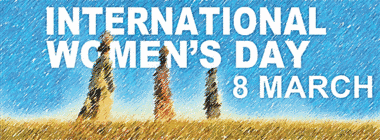Gender Equality

©CC-BY-SA-2.0/gbaku
UNESCO considers gender equality as a fundamental human right, a building block for social justice and an economic necessity.
It is a critical factor for the achievement of all internationally agreed development goals as well as a goal in and of itself.
Women make up more than two-thirds of the world's 796 million adults without basic literacy skills; women represent less than 30% of the world’s researchers; and women journalists are more exposed to assault, threat or physical, verbal or digital attack than their male counterparts.
UNESCO believes that all forms of discrimination based on gender are violations of human rights, as well as a significant barrier to the achievement of the 2030 Agenda for Sustainable Development and its 17 Sustainable Development Goals. Among these 17 goals is the SDG 5, which aims at “reaching gender equality and empowering all women and girls”.
Our message is clear: women and men must enjoy equal opportunities, choices, capabilities, power and knowledge as equal citizens. Equipping girls and boys, women and men with the knowledge, values, attitudes and skills to tackle gender disparities is a precondition to building a sustainable future for all.
UNESCO makes an original and holistic contribution to creating an enabling environment for gender equality through coordinated actions in its five distinct major programmes:
- In Education, UNESCO addresses gender disparities and promotes equality throughout the education system – in participation in education (access), within education (content, context and practices, delivery modes and assessments), and through education (learning outcomes, life and work opportunities)
- In the Natural Sciences, UNESCO works towards providing strong role models for women, develops women’s capacities, and supports knowledge generation and dissemination that contributes to advancing equitable and sustainable development
- In the Social and Human Sciences, UNESCO fosters the inclusion of gender equality considerations in social inclusion and transformation policies. In its activities targeting young people, the Organization places special emphasis on the needs, expectations and aspiration of women in disadvantaged positions. It also develops the capacities of men and boys to become strong gender equality advocates
- Ensuring that women and men equally enjoy the right to access, participate in and contribute to cultural life is a guiding principle for UNESCO’s work on Culture. The international Cultural Conventions promote the inclusion of all community members in their implementation at the international, national and local levels, encouraging women and men to benefit equally from heritage and creativity
- UNESCO’s Communication and Information programme spearheads unique initiatives to empower women and girls, such as the development of Gender-Sensitive Indicators for Media (GSIM) and the promotion of gender-sensitive Open Educational Resource policies.
UNESCO has been working in all of its domains to promote gender equality and women's rights and empowerment. Gender Equality has been one of two Global Priorities of the organization since 2008. Global Priority Gender Equality is implemented through result-oriented actions both within the Secretariat and in Member States with a wide range of partners.
Through identifying Gender Equality as a global priority for the Organization, UNESCO has committed to making a positive and lasting contribution to women’s empowerment and gender equality around the world.
International Women’s Day

© UNESCO
The International Women’s Day is a global celebration of all women, everywhere.
It is a rallying call; both for reflection on lessons learned and for accelerating momentum towards gender equality and the empowerment of every girl and woman. It is a day to rejoice in the extraordinary acts of women and to stand together, as a united force to advance gender equality around the world.
In 2018, the UN theme for International Women’s Day, is “Time is Now: Rural and urban activists transforming women’s lives,” echoing the priority theme of the 62nd session of the UN Commission on the Status of Women.
The UN will draw attention to the rights and activism of rural women, who make up over a quarter of the world population and majority of the 43 per cent of women in the global agricultural labour force. Rural women and their organizations represent an enormous potential, and they are on the move to claim their rights and improve their livelihoods and wellbeing.




